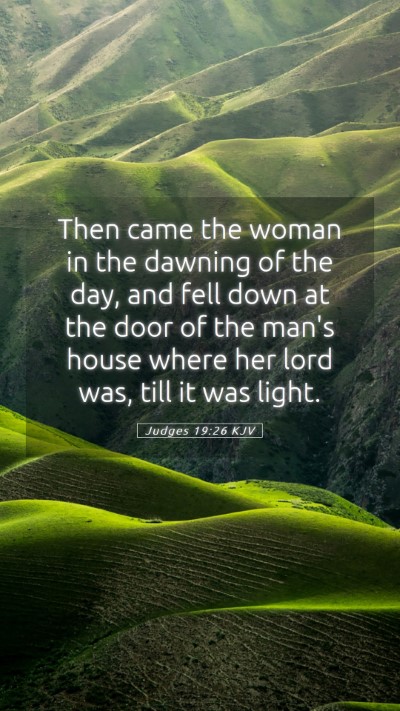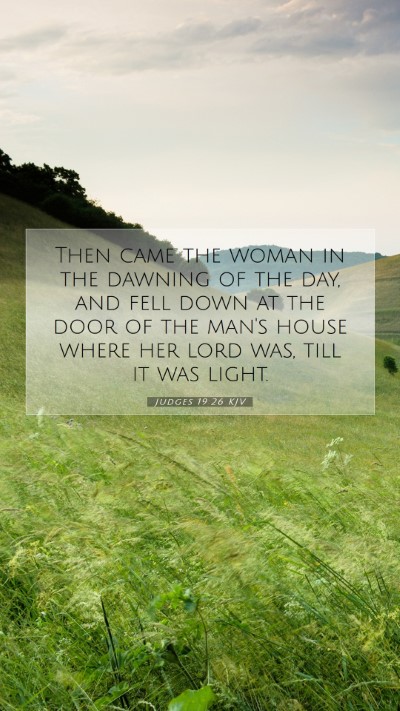Understanding Judges 19:26
The verse Judges 19:26 describes a dramatic and troubling moment in the narrative of a Levite and his concubine. In this passage, the concubine, having been brutally treated by men in Gibeah, falls at the threshold of her husband's door in an act that underscores the brutal reality of her situation. This verse calls for a deep scripture analysis to uncover the layered meanings embedded within.
Contextual Background
Judges serves as a historical account of Israel's transition between conquest and monarchy, highlighting a time fraught with moral decay and societal chaos. This particular chapter showcases the disturbing events that emanated from a breakdown of social order and respect for human dignity. According to Matthew Henry, this portion amplifies the horrific state of Israel during the period of the Judges.
Verse Analysis
Judges 19:26 reads: “Then came the woman in the dawning of the day, and fell down at the door of the man, her lord, till it was light.” This act is laden with several implications:
- Desperation: The woman's state exemplifies her desperation and the tragic consequences of living in a society devoid of justice as noted by Albert Barnes.
- Symbolism of Dawn: The dawn symbolizes a new beginning, but in this case, it reveals continued suffering and a lack of hope, as highlighted by Adam Clarke.
- Return to Safety: Her return to her husband’s home reflects the faint hope of safety amidst her traumatic experience, emphasizing the need for protection and refuge in dire times.
Thematic Implications
This verse invites readers to confront difficult Bible verse explanations. The overarching themes include:
- Moral Decay: The inhumane treatment of women and the absence of societal responsibility reflects the moral vacuity of the time.
- Human Dignity: The narrative forces a confrontation with issues of human dignity, inviting cohorts in bible study groups to examine how societal norms can lead to violence.
- Seek Justice: Just as the Levite must confront the reality of his wife's fate, modern readers are called to seek justice and advocate for those who are oppressed.
Cross References
This verse can be referenced alongside:
- Genesis 19:4-5 - The hospitality laws and the violent intentions of the men of Sodom, paralleling the wickedness found in Gibeah.
- Judges 20:1-2 - The ensuing conflict illustrating the need for societal justice.
- Micah 6:8 - The call to act justly, love mercy, and walk humbly with God, contrasting the actions seen in Judges.
Application to Daily Life
In applying the meaning of Bible verses to our daily lives, Judges 19:26 demands us to:
- Reflect on our societal responsibilities towards the vulnerable.
- Engage in online Bible study sessions that challenge us to think critically about justice and mercy.
- Use bible study tools and resources to understand the broader implications of our actions and the importance of advocacy.
Conclusion
Judges 19:26 serves as a poignant reminder of the complexities involved in the understanding Scripture. Through Biblical exegesis and a close examination of the texts, readers gain insight not only into the ancient world of the Judges but also into relevant social issues of today. Engaging deeply with this verse opens opportunities for meaningful dialogues within Bible study lessons and enhances our comprehension of the often neglected aspects of justice.


